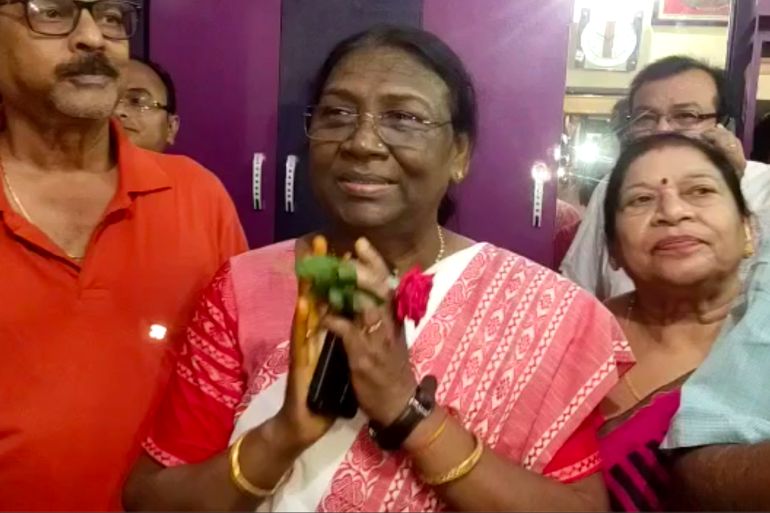India’s BJP nominates female tribal politician for president
If elected, Droupadi Murmu, 64, will become the country’s first tribal and the second-ever female president.

A female Indian politician from a tribal community has been nominated as presidential candidate by Prime Minister Narendra Modi’s ruling nationalist party, officials said.
Droupadi Murmu, 64, a veteran politician who has held senior posts in the eastern state of Odisha, is almost certain to be elected as Modi’s ruling Bharatiya Janata Party (BJP) holds a majority in parliament and is likely to get the support of other parties in state assemblies, say political analysts.
Keep reading
list of 3 itemsIndian politicians vote to elect new president
Should there be a President?
The BJP chose Murmu at the party’s parliamentary board meeting on Tuesday chaired by Modi. Party president J P Nadda told reporters they felt the next president should be a female tribal candidate.
Parliamentary and state legislators vote for India’s president, who holds a largely ceremonial post. The voting will be held on July 18.
Murmu was born in a family of the Santhal tribe in the eastern Odisha state. Her father and grandfather were village headmen in Baidaposi in the state’s Mayurbhanj district.
She started her career as a school teacher and actively participated in tribal rights issues. She later joined mainstream politics as a BJP legislator and governor of Jharkhand state in the east.
In a tweet late on Tuesday night, Modi said Murmu “devoted her life to serving society and empowering the poor, downtrodden as well as the marginalised”.
“I am confident she will be a great president of our nation,” he posted.
Millions of people, especially those who have experienced poverty and faced hardships, derive great strength from the life of Smt. Droupadi Murmu Ji. Her understanding of policy matters and compassionate nature will greatly benefit our country.
— Narendra Modi (@narendramodi) June 21, 2022
If elected, Murmu will become the first tribal president and the second-ever female president.
Journalist and political analyst Arati R Jerath told Al Jazeera the BJP’s choice is “a very clever one for several reasons”.
“One is that no tribal has ever held the post of the president. Symbolically, this is a very important step for tribals who comprise a very large section of the population,” she said.
“More than that, the choice has the potential to create divisions in the opposition because parties like the Congress and the Jharkhand Mukti Morcha have many tribal MPs and MLAs. It is going to be very difficult for those tribal MPs to vote against a tribal woman.”
Opposition names BJP rebel
Indian opposition parties said they would back Yashwant Sinha, a BJP rebel, as their candidate for the presidential election.
Sinha, 84, had served as the country’s finance minister during the previous BJP government from 1998 to 2002. He quit the right-wing party following a divergence with Modi on economic issues in 2018.
Opposition's presidential candidate Yashwant Sinha to hold the first meeting of the Campaign Committee (for the Presidential poll) today.
(File photo) pic.twitter.com/BcCbxDkMFt
— ANI (@ANI) June 22, 2022
After leaving the BJP, Sinha joined the opposition Trinamool Congress party which he again quit after being nominated as the opposition candidate for the Indian president.
“Now a time has come when for a larger national cause I must step aside from the party to work for greater opposition unity,” he tweeted on Tuesday.
Jerath told Al Jazeera the opposition’s decision to field Sinha was “an attempt to create unity among the opposition parties”.
“But what the BJP has succeeded in is that by choosing a tribal woman, it will probably disunite the opposition,” she said.
The Indian constitution provides a largely ceremonial role for the president, with the prime minister and his cabinet holding executive powers.
But the president has a key role during political crises, such as when a general election is inconclusive, by deciding which party is in the best position to form a federal government.
Bilal Kuchay contributed to this report from New Delhi.